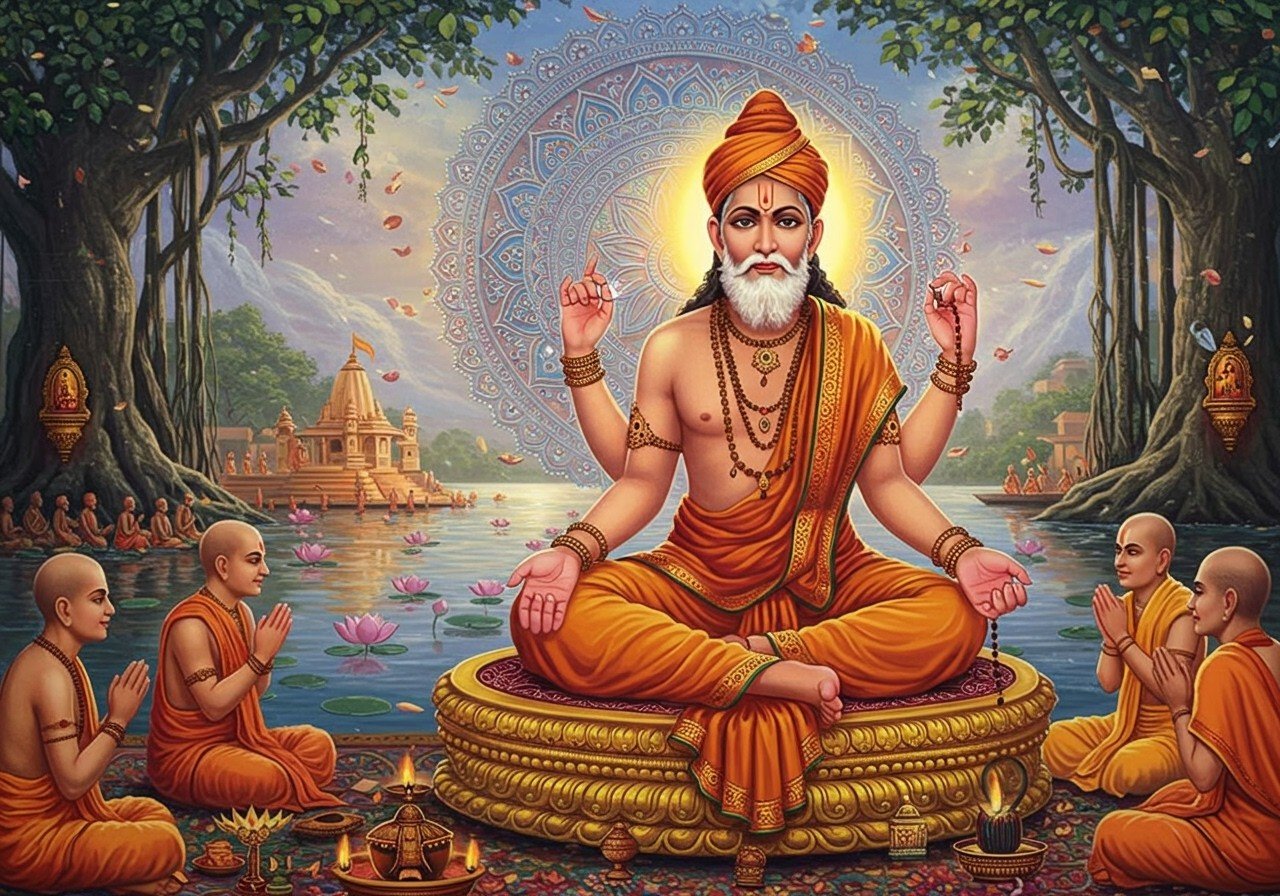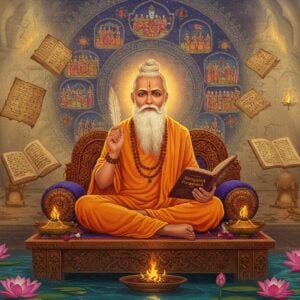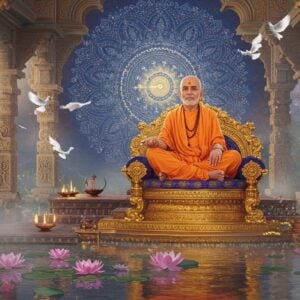
Narasimha Saraswati, a revered spiritual figure in the Dattatreya tradition, is considered the second incarnation of Lord Dattatreya in Kali Yuga. His life, spanning from 1378 to 1459, left an indelible mark on Indian spirituality, emphasizing dharma, devotion, and self-realization. This exploration delves into the life, teachings, and enduring legacy of this influential guru.
Birth and Early Life
Born as Shaligramadeva in Karanjapura (present-day Lad-Karanja, Maharashtra) to Madhava and Amba-Bhavani, a Deshastha Brahmin family, Narasimha Saraswati’s early life hinted at his spiritual destiny. The socio-religious environment of the time played a pivotal role in shaping his worldview, eventually leading him towards a life dedicated to spiritual pursuits. At the tender age of seven, he embarked on a transformative journey.
The Ascetic’s Path and Profound Teachings
At the age of seven, Shaligramadeva left his home, embarking on a pilgrimage to the holy city of Kashi (Varanasi). There, under the guidance of Shri Krishna Saraswati, he embraced Sanyasa (renunciation), receiving the name Narasimha Saraswati. This marked the beginning of his life as a wandering ascetic, dedicated to spiritual growth and disseminating wisdom.
Narasimha Saraswati’s teachings, rooted in Advaita Vedanta, emphasized the unity of the individual soul (Atman) with the ultimate reality (Brahman). He stressed the importance of self-realization, recognizing the divine within each being. He traveled extensively, sharing his wisdom and reviving Vedic traditions and rituals. His emphasis on the Guru-Shishya (teacher-student) relationship highlighted the crucial role of guidance in spiritual development.
Explore our collection of Panchmukhi Hanuman idols and other spiritual figures, crafted with utmost reverence and devotion.
Enduring Significance and Legacy
Narasimha Saraswati’s influence extended beyond his immediate followers. He became a guiding light during a period when adherence to core Hindu values faced challenges. People from diverse backgrounds sought his counsel, healing, and blessings. He embraced inclusivity, making no distinctions based on caste, creed, or social status. His final years were spent in Ganagapura (Karnataka), which remains a significant pilgrimage site to this day.
The Shri Guru Charitra, authored by Shri Saraswathi Gangadhar, serves as the primary source of information about Narasimha Saraswati’s life and teachings. This revered text offers profound insights into his philosophy and continues to inspire spiritual seekers. Within the Datta-Sampradaya, he is highly revered, known for miracles and fulfilling the desires of his devotees. It is believed that he entered Samadhi for 300 years, later reappearing as Swami Samarth.
Learn more about other influential figures in Hinduism with our blog post on Lord Narasimha Temples.
Poojn.in: Supporting Your Spiritual Journey
Poojn.in, India’s leading online store for cultural and religious goods, offers a wide selection of items to support your devotion to Shri Narasimha Saraswati. Enhance your spiritual practices with:
- Pure Copper Debi Ghat: Perfect for storing and offering holy water during rituals. Poojn.in offers various sizes to meet your needs. Browse our selection here.
Find the ideal copper vessel for your puja needs, ensuring authenticity and quality. - Brass Saraswati Mata Murti: Honor the goddess of knowledge and wisdom with a beautifully crafted murti. Explore our collection.
These murtis are crafted with intricate details, ideal for your home altar or spiritual space.
Conclusion
Narasimha Saraswati’s life and teachings offer profound wisdom for navigating the complexities of life. His emphasis on dharma, devotion, and self-realization continues to inspire spiritual seekers worldwide. His legacy, preserved through sacred texts and the enduring reverence of his devotees, serves as a timeless reminder of the transformative power of spirituality. Explore more about Saraswati Puja and other related rituals on our blog.
FAQs
Who is Narasimha Saraswati?
He’s a revered guru in the Dattatreya tradition, considered the second incarnation of Lord Dattatreya. He is known for his emphasis on dharma and self-realization.
Where was he born?
He was born in Karanjapura (modern-day Lad-Karanja, Maharashtra), India, to a Deshastha Brahmin family.
What are his core teachings?
His teachings center on Advaita Vedanta, emphasizing the unity of the individual soul with the ultimate reality. He advocated for dharma, Vedic traditions, and the importance of the Guru-Shishya relationship.
Why is he considered influential?
He influenced society during a period when some Hindu traditions were waning. He offered guidance and healing to people of all backgrounds, emphasizing inclusivity.


